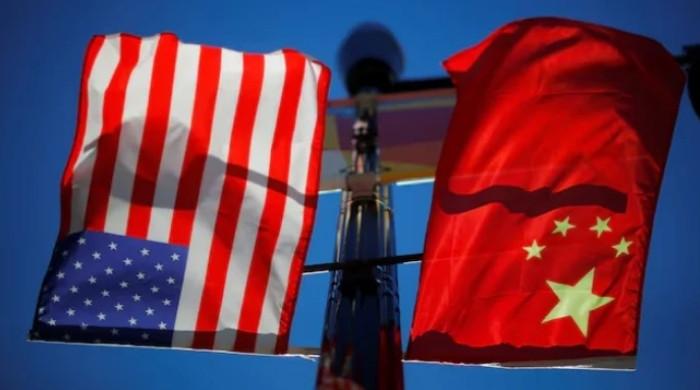Washington: Despite the hard response of China of slapping 125% of the rate against the United States, President Trump described his tariff strategy as a positive movement for the United States and the world, emphasizing that his policy was “very good.”
The investors left the US government bonds. UU., The dollar fell and the shares looked like Beijing reprisals against Trump deepened concerns in the global markets already traumatized.
Trump sent the financial markets to a tail tail when announcing radical import taxes in dozens of commercial partners last week, only to re -roll up to 10 percent on Wednesday for 90 days, while collecting taxes in China goods.
“We are going very well in our tariff policy,” Trump said in a publication about his Truth social network after China announced his last increase.
“Very exciting for the United States, and for the world! He is moving quickly,” he wrote.
The White House later said Trump was still “optimistic” on an agreement with China, and added that another 15 countries have “on the table” during their 90 -day break in their tariffs.
But the press secretary, Karoline Leavitt, added that “the president made it very clear, when the United States is beaten, he will return stronger.”
The United States and Beijing have been exchanging rates of increasingly hard fees since last week.
The Chinese president, Xi Jinping, gave his first important comments on tensions on Friday, and the state media cite him by saying that his country “was not afraid.”
XI also said that the European Union and China should “jointly resist unilateral intimidation practices” during conversations with the Prime Minister of Spain, Pedro Sánchez.
‘Number game’
Beijing announced after XI’s comments that the new 125 percent tariffs in US goods would take effect on Saturday, almost coinciding with the amazing level of 145 percent imposed on Chinese products that arrive in the United States.
A spokesman from the Chinese Ministry of Commerce said that the United States had all the responsibility, ridiculing Trump’s tariffs as a “game of numbers” that “will become a joke.”
But China’s Ministry of Finance said tariffs would not rise more in recognition that imports are almost not possible in the new level.
Trump had reiterated on Thursday that he was looking to make an agreement with XI despite the growing tensions.
“He has been my friend for a long period of time. I think we will end up calculating something that is very good for both countries,” he told reporters.
But US officials have made it clear that XI will arrive first.
However, the pressure was growing in Trump, since the markets continued to worry.
The yields of the crucial bonds of the United States government, which are normally seen as a safe refuge, rose again on Friday, indicating a weaker demand as investors are scared.
However, the White House said it had no evidence to support the speculation of merchants that China was downloading some of its vast holdings, which increase the cost of loans for the United States government, in retaliation.
Meanwhile, the policy formulators of the United States Federal Reserve warn about greater inflation and slower growth ahead due to Trump’s tariff policy.
‘Countermeasted’
Economists warn that interruption in commerce between narrowly integrated US and Chinese economies will increase prices for consumers and could cause a global recession.
Ipek Ozkardeskaya, an analyst at Swissquote Bank, told AFP that the rates figures were “so high that they no longer make sense”, but said that China was “now ready to go to the measure of what is necessary.”
The rest of the world is still calibrating his answer.
Trump described the European Union on Thursday, which was originally reached with 20 percent of Trump tariffs, as “very intelligent” to refrain from retaliation taxes.
The senior EU officials and Chinese leaders will celebrate their next summit that marks 50 years of ties in China in July, Brussels announced. Meanwhile, the EU Maros Sefcovic Chief of Commerce will hold conversations in Washington on Monday.
But the main Ursula von der Leyen of the 27 -nations block told the Financial Times on Friday that it remained armed with a “wide range of countermeasures”, including possible success in digital services that would hit US technology companies.




